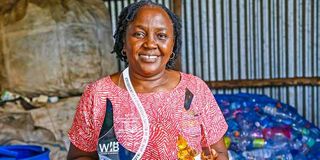
Junky Bins CEO and founder, Lucy Ngorongo poses displays her trophies, at Junky Bins material recovery facility in Kinoo, Kiambu County on June 10, 2025.
Lucy Ngorongo is a fearless treasure hunter. She considers waste collection a treasure-hunting expedition that she takes on proudly.
She leads a team of about 25 men and women as the founder and CEO of Junky Bins—a waste management company located along Limuru Road in Nairobi’s Parklands area. The business offers comprehensive services, including residential, commercial, hospitality, and industrial waste collection, transportation, and disposal.
For about 15 years, Junky Bins has distinguished itself not just as a waste management company, but a key cog in the wheels of reimagining Nairobi’s environmental future—one bin at a time. Think of the company as a waste conveyor belt from your doorstep to an ecosystem where 90 percent of the waste is aggregated, recycled, repurposed, and/or reused.
Lucy, an award-winning and passionate environment enthusiast of note started Junky Bins as a waste collection company which later transformed to a waste management company licensed to operate in Nairobi and Kiambu counties out of a strong passion for the environment. The company’s mission is to change the traditional “throw-away” model to a sustainable, socially inclusive and environmentally sound enterprise.
“I had a vision in 2008 anchored on a popular phrase, ‘the Nairobi We Want’. As a person who grew up in Nairobi’s Jericho area, I have witnessed firsthand the growth in population in the city and consequently how waste management has transitioned from a very organised system to a menace that keeps ballooning. I lived in Kitengela then, and at the onset, I started with my household, then upscaled to my neighbours and neighbourhood, then later moved to Nairobi where the problem seemed bigger,” she says.
Available landfill
The boldness in their vision led to the birth of an endeavour of one of the company’s core mandates, which is to make waste work.
“When I look at all the waste we turn in as a city, it is not sustainable to release all of it to the only available landfill in Dandora, and even if we had space and the capacity for it, it would cause the environment serious harm. Around 2017, I desired to reimagine how we deal with waste and that’s when the idea of waste management came in. Today, it is possible to manage safely about 90 percent of the waste we collect. We believe that segregation at source is a sure way to reduce the amount of waste that ends up in landfills. This is how; when you separate, say, inorganic waste from organic waste, you make it easier for the recipients at the collection facilities to separate the waste according to its next use—whether it will be recycled, repurposed or reused and manufactured into a new product. At source, we issue two types of waste collection bags, colour-coded for easier sorting of waste. One for collecting dry waste and the other for collecting wet or organic waste. This segregation reduces the chances of waste finding itself back in the environment while it could be put to the right use that is less harmful to the environment,” She continues.
Junky Bins operates a Material Recovery Facility in Kinoo in the outskirts of the city, where the waste they collect from various places in the city is sorted into organic and inorganic streams. This initial sorting is critical, as it enables efficient recovery, recycling, and reuse of materials that would otherwise end up in overflowing landfills or informal dumpsites. They have partnered with aggregators of inorganic waste—including plastics, paper, glass, and metals which they collect from Junky Bins at a fee and later process for recycling or upcycling.
Paper and cartons
Plastics can be shredded and re-manufactured into items such as flower pots, fencing poles, or even water tanks. Paper and cartons are pulped and reused in packaging, insulation or in manufacturing items such as toilet paper and kitchen towels. Lucy’s vision of the Material Recovery Facility is to grow it so that the company gets to manage all their waste on site and reduce operational costs that arise from transporting it to the landfill in Dandora.
One of their flagship initiatives is its Black Soldier Fly (BSF) project that started in 2019. Organic waste from households, commercial buildings, and restaurants is used to rear BSF larvae. These larvae consume the waste rapidly, leaving behind high-quality compost and biomass. The larvae are harvested as a protein-rich feed for poultry, pig, and fish farming—offering a sustainable alternative to traditional animal feeds, which are often expensive and environmentally taxing. Additionally, the compost becomes a valuable soil conditioner for organic farming. This closed-loop approach reduces methane emissions from rotting organic waste and eliminates the need for chemical fertilisers.
“We started the first pilot in 2019 in my house. It is possible to do BSF in a small space. The pilot was very successful, and in 2020, we confirmed the immeasurable value it has. In just a day, we collected 17 kg of larvae, which is poultry feed. We collected fertiliser as well.”
The company is in the last stages of a plan to build a greenhouse that will act as a stand-alone BSF facility. Currently, they are only doing 90kgs of organic waste, with a dedicated facility, this can triple or even quadruple.”
Junky Bins is one of 110 SMEs that has partnered with the Kenya Climate Innovation Center under the center’s Sustainable Waste Innovation for a Future in Transition (SWIFT) program. The initiative funded by IKEA Foundation supports waste entrepreneurs by providing business advisory, technical assistance, mentorship and financing.
Through the company’s initiatives, Lucy is a proud recipient of several awards, such as the 2022 Environmental Leader of the Year Award, under the Women in Business Network and the 2024 KEPSA Best Women-Led SME on Innovation Award. Internationally, she is a recipient of the Global Women Innovation and Inventors Network in London.






